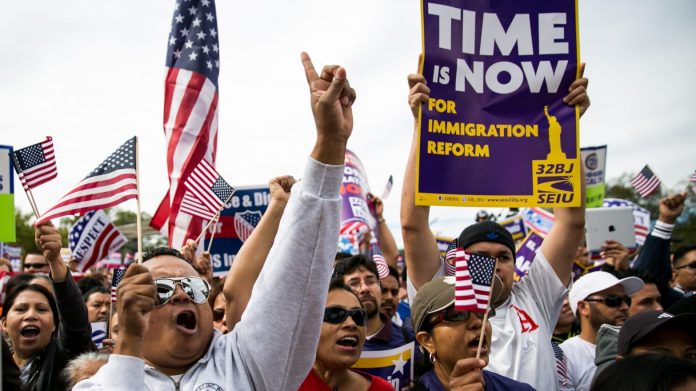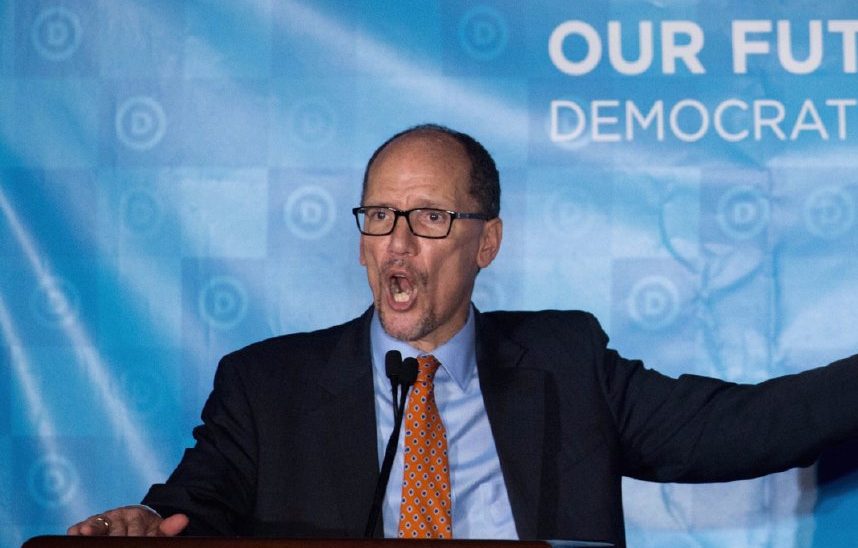Immigrants are key to unions’ survival and, for some unions, the key to changing America’s economic system.
The nexus between unions using immigrants to rebuild their membership ranks and to change America’s free-market system is becoming more and more transparent heading into the 2020 elections.
Overall, as a percentage of the workforce, unions have been declining in the United States have been declining since the 1950s.
As NBC News reported over the weekend, “labor activists and scholars point out that growing numbers of Latino members could help strengthen labor’s message as unions broaden their causes to include civil rights, gender and immigration issues while they focus on voter engagement and registration.”
This isn’t exactly new news, however.
After decades of fighting illegal immigration, unions changed their stance in 2000 “when the executive council of the AFL-CIO voted to reverse itself,” according to NPR, “calling for undocumented immigrants to be granted citizenship.”
Nearly a decade later, in 2009, Eliseo Medina—at the time, an international vice president of the Service Employees International Union (SEIU) and then-Honorary Chair of Democratic Socialists of America—exposed the Left’s need for ‘immigration reform’ when he explained to an audience how important immigrants are to the progressive movement.
“If we have 8 million new voters … we will create a governing coalition for the long term, not just for an election cycle,” Medina stated.
A decade later, since Medina’s speech, the goals of the SEIU have not changed.
“We are in robust dialogue in this country to recognize union strength and worker power as a way to achieve success on so many fronts,” says Maria Peralta, national political director at the Service Employees International Union (SEIU). “Whether it is health care or the environment, engaging Latinos on different levels can shift the power of the economy.”
The change in stance from the AFL-CIO—a federation of more than 50 U.S.-based unions—“was the result of years of internal pressure from unions representing service workers, a large number of whom were Latino,” reported NPR in 2013.
According to the Democratic Socialists of America, it was SEIU’s Eliseo Medina who “is widely credited with playing a key role in the AFL-CIO’s decision.”
And the U.S. economy has shifted from a mostly-manufacturing base to more service-economy base, the demographics in unions have become more diverse.
“Labor organizers point to unions’ growing dependence on brown and black members, including a significant number of immigrants, particularly in the service and health care industries,” NBC reports.
“Democrats, who align with labor on issues such as higher minimum wages and immigration, should recognize that labor participation helps translate Latino numbers into tangible votes,” Armando Ibarra, chair of the Chicano and Latino Studies Department at the University of Wisconsin-Madison told NBC News.
“Similarly, labor needs the support of legislators at a time when their influence is continuously challenged,” Ibarra said.
As the Labor Council for Latin American Advancement concluded in its 2015 paper Latino Workers and Unions: A Strategic Partnership for America’s Progress:
“The potential for growth in organizing Latinos is a critical lifeline that labor unions must use in order to stay relevant. More importantly, labor unions can use this new membership to leverage a more pro-worker agenda and reverse the laws that have weakened collective bargaining for working people.”
Since the survival of unions is largely contingent on what happens in Washington, and progressive Democrats survival is largely dependent on what happens with unions, the transactional relationship between the unions and progressives will be even more evident rolling into 2020.





